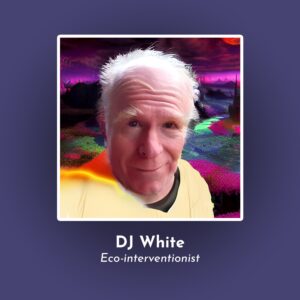
Ep 51 | DJ White
DJ White: “Ocean Effectivism”
Show Summary:
On this episode, Nate is joined by Eco-interventionist and long time friend DJ White. DJ is not necessarily a household name but has been instrumental in successful environmental interventions – primarily for the oceans – for the last four decades. The list of his behind-the-scenes accomplishments is long, but today he joins Nate to describe how to be effective in change-making and outlines ways that current activist efforts could be improved. He also shares his own profound experiences with some of Earth’s most intelligent creatures and how these cetacean friends shaped his life’s work.
About DJ White:
DJ White is a co-founder of Greenpeace International and founder of EarthTrust. He has played a leading role in protecting dolphins, whales, sea turtles, and countless other marine animals, including being the driving force behind the transition to more dolphin-friendly tuna, stopping widespread use of ocean drift nets in the 1980s, successfully stopping a national dolphin drive kill, and breaking the deadlock in capping the Kuwait oil fires.
In French, we have a motto that says that a simple drawing is often better than a long explanation. Jean-Marc Jancovici Carbone 4 President
That’s very understandable because with left atmosphere thinking, one of the problems is that you see everything as a series of problems that must have solutions. Iain McGilchrist Neuroscientist and Philosopher
We can’t have hundreds and hundreds of real relationships that are healthy because that requires time and effort and full attention and awareness of being in real relationship and conversation with the other human. Nate Hagens Director of ISEOF
This is the crux of the whole problem. Individual parts of nature are more valuable than the biocomplexity of nature. Thomas Crowther Founder Restor
Show Notes & Links to Learn More
Download transcript00:40 – DJ White Info + Works
00:55 – GreenPeace International
01:11 – The Oil Drum
01:16 – Reality Blind vol. 1 and The Bottleneck Reader
05:23 – International dolphin campaign
06:05 – Self-awareness test
06:17 – Species Survival Network, CITES, EarthTrust
06:40 – International label for dolphin friendly tuna
07:38 – The Cove movie
07:23 – Kuwaiti Oil Fires
13:22 – John C. Lilly
15:52 – Threats to dolphin population
19:01 – Operant Conditioning
21:45 – Dolphin sonar
24:01 – Dolphins are social creatures
27:45 – CO2 effects on oceanic vertebrates
28:20 – Big, slow-reproducing organism get wiped out first in extinction events
29:08 – A child born today is expected to outlive coral
29:20 – Over 25% of all ocean creatures spend a part of their life cycle in coral reefs
29:35 – Importance of calcium for skeletons and food webs
30:25 – Largest brains in the universe talking to each other underneath the ice
31:30 – Aza Raskin + Earth Species Project + TGS Episode
32:10 – Video of dolphin stuck in fishing line approaching humans for help
37:50 – Thermal Maximum
39:50 – Collapse in biodiversity, Madagascar, Syria, Ukraine, Bangladesh…
40:23 – Fossil fuels created before the existence of termites and lignin eating bacteria
42:23 – Arthur C. Clarke
43:21 – ‘Renewable’ energy isn’t really renewable
44:41 – Could you make a solar panel with electric power
45:38 – What We Owe the Future – MacAskill, Existential Risk – Nick Bostrom
49:25 – It’s easy to have empathy for an individual, it’s difficult for large numbers
50:59 – Margaret Mead
51:10 – Why small groups are better at solving problems
57:05 – Keeling Curve
59:05 – Germany and Eastern US bringing back coal for energy security
1:00:40 – We’ve had access to more energy year over year for the last couple hundred years
1:07:13 – Near Term Extinction Movement
1:13:40 – Systemic financial risks
1:17:20 – Running out of asphalt to maintain roads, primary railroads retired and torn up
1:22:55 – Taiwan Dolphin Drive Kill
1:31:13 – John McAfee
1:35:20 – The Green Revolution, Norman Borlaug
1:37:25 – Fukushima
1:37:58 – Thorium
1:40:35 – Tritium, liquid helium scarcity
1:48:11 – Deep time – Animals and plants have been on earth for 4-4.5 billion years, and will only be around for another half billion
1:52:47 – Hydrogen Sulfide







